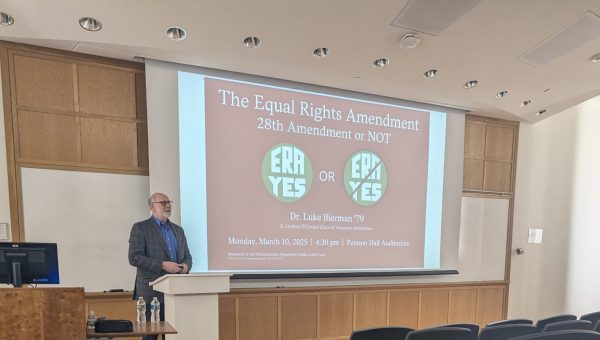Kappa Alpha Theta Receives 4-Year Suspension

Colgate’s chapter of Kappa Alpha Theta has received a four-year suspension in response to an incident of alcohol-related hazing that occurred on September 16. Theta had previously been placed on an interim suspension due to the incident, which took place one day after new members had received their invitations to join the sorority.
Soon after the incident, the national Grand Council of Kappa Alpha Theta withdrew national recognition from Colgate’s chapter. A statement from the national headquarters said that “destructive and dangerous behavior on the part of active chapter members had led university administrators to suspend the chapter,” and that, “Grand Council believes that closing the chapter was necessary to uphold our standards and send a clear message that irresponsible conduct will not be tolerated.”
An organizational misconduct hearing was held, in which Theta admitted responsibility for hazing their membership and for violating the University’s alcohol policy. The Student Conduct Board, made up of faculty, students and administrators, recommended an eight-year suspension.
“I lowered the suspension [from eight years to four] because this is the norm of what we have done in the past,” Vice-President and Dean of the College Charlotte Johnson said. “The leadership really stepped up to the bat in terms of taking responsibility and owning up to their actions. This helped to reduce the penalty.” Johnson also stated that lowering the punishment to four years “reduces the risk that the group will go underground.”
All sorority activities, including gathering as a group as well as recruiting new members, have been disallowed during the four-year suspension, which will run through May 2013. At that time, the group will be able to apply to the national Kappa Alpha Theta offices for the reinstatement of their recognition. If the national charter is reinstated, the University may reinstate the organization. If not, the University may derecognize Theta altogether.
In addition, the sorority’s main house at 40 Broad Street has been closed for the remainder of the semester and has to be vacated by the nine women who reside there by October 31. Those women will move next door to the Annex until the end of the semester, when they will be relocated to other available student housing. The Annex will remain a student residence, and those women living there will continue to do so.
The main house at 40 Broad Street will be closed until the Fall semester of 2009, when it will be made available as normal student housing for groups to apply for. The Office of Residential Life will handle those applications.
All initiated members of Theta are expected to receive alumnae status by the national headquarters and so will not be able to affiliate with any other sorority. However, there are 49 new members who had not been initiated before the suspension. There is concern in the University administration as to what is to happen to these women.
“My impression is that they feel, despite the fact that members of their fellowship hazed them, that they want a Greek alternative,” Assistant Dean of Students and Director of Greek Life Tim Mansfield said. “These women are asking how Colgate is going to help them. They went Greek for a reason.”
The suspension of Theta has ignited a new effort to bring another sorority to campus. Colgate’s Panhellenic Association has formed an Extension Committee, made up of representatives from the three recognized sororities, members of the Panhellenic Association and a sophomore from Theta’s uninitiated class. Currently, they are in the first phase of the National Panhellenic Conference Extension process.
“Right now, we’re pulling together facts and figures,” Kappa Kappa Gamma president – and member of the Extention Committee – senior Kate Kokanovich said. “We’re looking at recruitment data from the last five years, chapter membership statistics and other data.”
After gathering all of the appropriate data, the committee will assemble a proposal enumerating why they feel a new sorority is necessary. That proposal will be made to Johnson, who will ultimately decide whether or not to allow a new sorority on campus. Smigen is hopeful that this decision will come by the end of this semester.
“At this point, Colgate is not officially considering expanding its Greek system,” Mansfield said. “Our commitment over the last several years has been to strengthen our existing organizations and to ensure that they are safe and successful. The interest to colonize more groups has been somewhat spoiled by [Theta]. A question we have to ask ourselves is ‘Why colonize more groups when we can’t prove that the ones that we have are strong and successful?'”
“I’m willing to listen to any group talking about expanding the [Greek] system,” Johnson said, “but it’s ironic that we’re talking about expansion under these circumstances. The focus should be on how we tackle the problems that led to the loss of a sorority … in the first place.”
“We know there is a need for [another sorority],” Kokanovich said. “What we need to do is to show that this need exists. We need to … look at the positives and negatives of Greek Life and prove how it contributes to Colgate.”
With only three recognized sororities on campus, many are concerned about recruitment next year if no new sorority is brought to campus.
“It would be a difficult fall for sororities, that’s for sure,” Kokanovich said. “We’re looking at pledge classes of around 80 girls. That’s a ridiculous number. It’s unfathomable.”
“I think there is an imbalance with six fraternities and three sororities,” Mansfield said. “The membership numbers show that, without Theta, there are about 376 members of the three sororities and about 406 in all six fraternities. Even before this whole incident, the argument for a fifth sorority was really vocal.” He spoke of a three-sorority recruitment next Fall as “a really challenging prospect.”
Kokanovich said that there are very few options available for recruitment if no new sorority exists next fall. Either there will be very large classes in the three recognized sororities or recruitment will have to be limited, either by Colgate setting its own recruitment quotas or by raising the GPA requirement.
“Some people have a rough freshman year,” Kokanovich said in regards to raising the GPA requirement. “Should we punish them for that? If [the requirement] was raised when I was going through recruitment, I would have been ineligible.”
Colgate’s sororities are regulated by the National Panhellenic Conference, and it is this organization that sets recruitment quotas each year. GPA requirements are set by each organization’s national headquarters. For these reasons, the Extension Committee is not hopeful that these remedies would be approved.
Both Smigen and Kokanovich are optimistic about the Extension process being successful.
“The statistics show that more and more girls each year are going through recruitment,” Smigen said. “There was probably a need for another sorority even before [Theta’s suspension].”
“I’m very optimistic,” Kokanovich said. “The Committee has a lot of dedicated girls. We can demonstrate the need for another sorority.”
Smigen explained that, if their proposal for a new sorority were approved by the Dean of the College’s office, preference would be given to the two sorority groups that have previously existed on Colgate’s campus: Alpha Chi Omega and Pi Beta Phi.
There have been attempts by other groups on campus to get new Greek chapters on campus for many years, including Jewish and multicultural groups. Smigen wants to make it clear that these requests have not been ignored. Greek organizations at Colgate are under two umbrella organizations: the National Panhellenic Conference and the North-American Interfraternity Conference, and Smigen explained that historically multicultural groups are not a part of these organizations. However, Johnson said that the door is still open for multicultural organizations to colonize at Colgate.
If all goes according to the schedule the Extension Committee is working with, a new sorority will be colonizing on Colgate’s campus by next fall.





